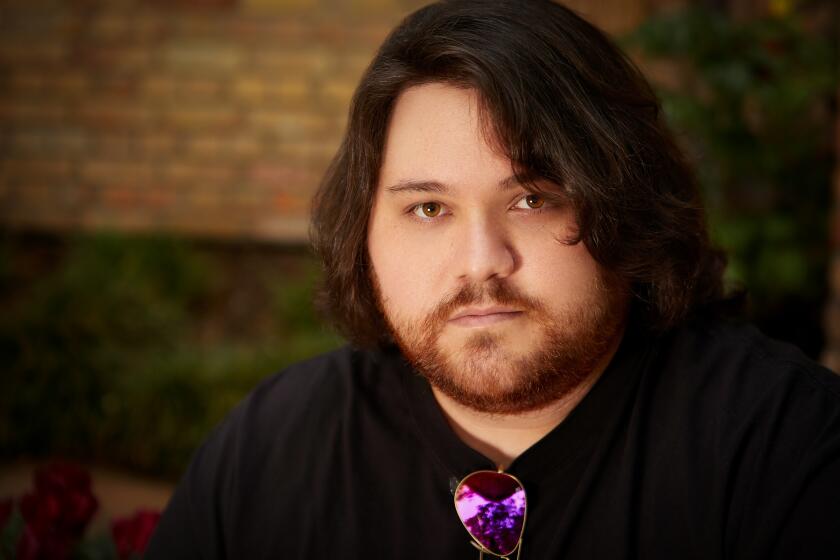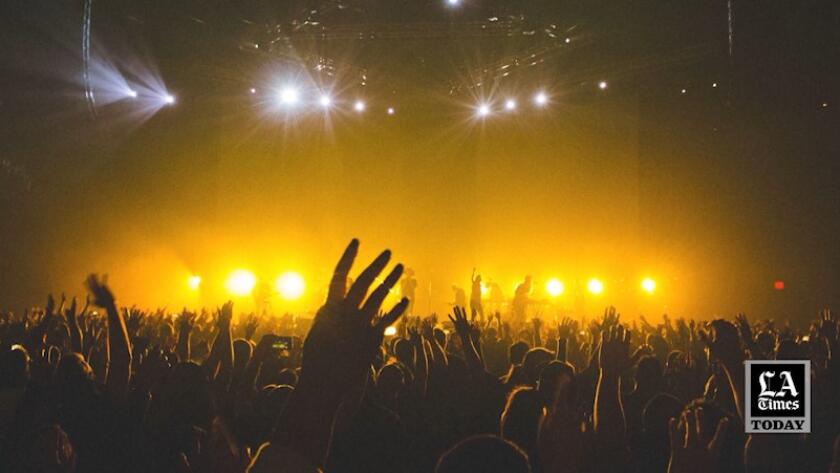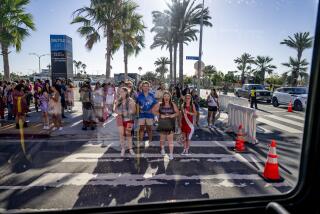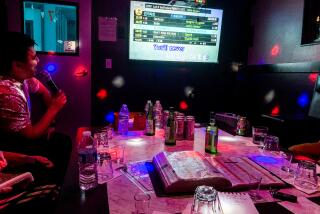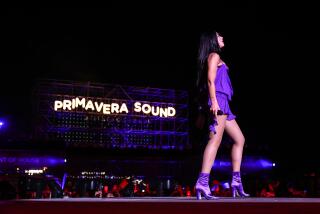Are concerts safe? For a growing number of artists and tour pros, risk outweighs reward
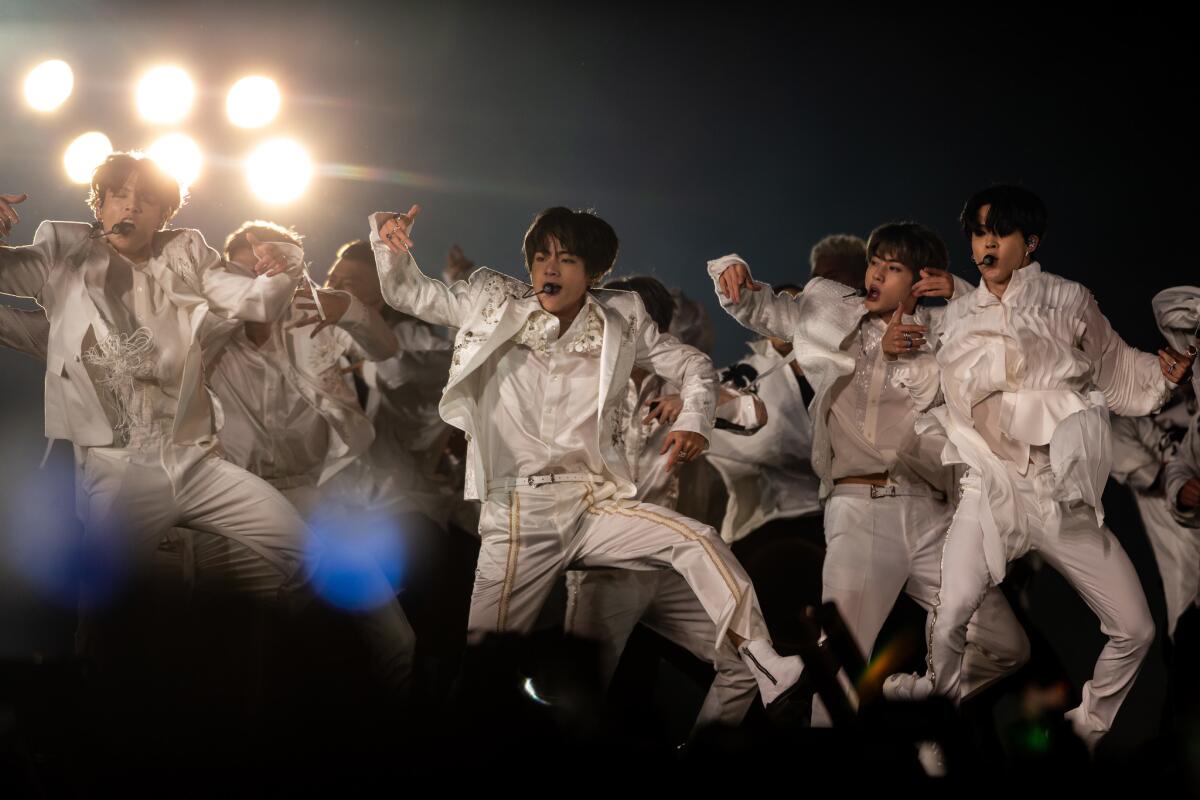
- Share via
Back in July, Madeline felt sick after a concert and knew she’d lose her job.
The L.A.-based musician and audio engineer — who asked to use a different name for this story, for fear of losing future work — was mixing sound for a support act on a medium-sized tour through the U.S. promoted by Live Nation. They were some of her first dates working in a year and a half.
At the end of the month, she said a portion of the crew — all vaccinated — fell ill after a show. Their tour manager got rapid COVID-19 tests for the whole 11-member team (paid from their own tour budget). Three members tested positive, including Madeline.
“The tour manager made the call to shut the tour down and go to a hotel to isolate. That was exactly the right way to do it,” Madeline said. But she’s frustrated to see tours once again falling apart over COVID-19 fears, just as many states end expanded unemployment and other support systems.
“Every show we played was in a hot spot, and no one working backstage at the local venues was masked. If you’re a smaller artist dependent on live events, there’s no way to be able to afford to test every day,” Madeline said. “There’s so much secrecy around this and there might well be outbreaks happening within this demographic, but we’re all shooting in the dark.”
Wolfgang Van Halen’s band Mammoth WVH will perform at the Whisky a Go Go in October, 40-plus years after his dad’s band made history there.
Concert promoters, crews, artists and fans — who had enjoyed a brief window of optimism just two months ago — are trying to figure out what to do as the Delta variant circulates. While vaccines still provide a very high degree of protection against severe illness and hospitalization, worries over Delta’s increased infectiousness have already sidelined major tours.
“It’s already having an impact in terms of postponements, and until we turn the tide, it will continue to have an impact,” said Ray Waddell, president of Oak View Group Media & Conferences, the parent firm of concert industry analyst Pollstar. He said that while the industry is “in large part united” on necessary policies to keep fans and professionals safe, “I had one promoter tell me that the reopening has been far more challenging than the shutdown.”
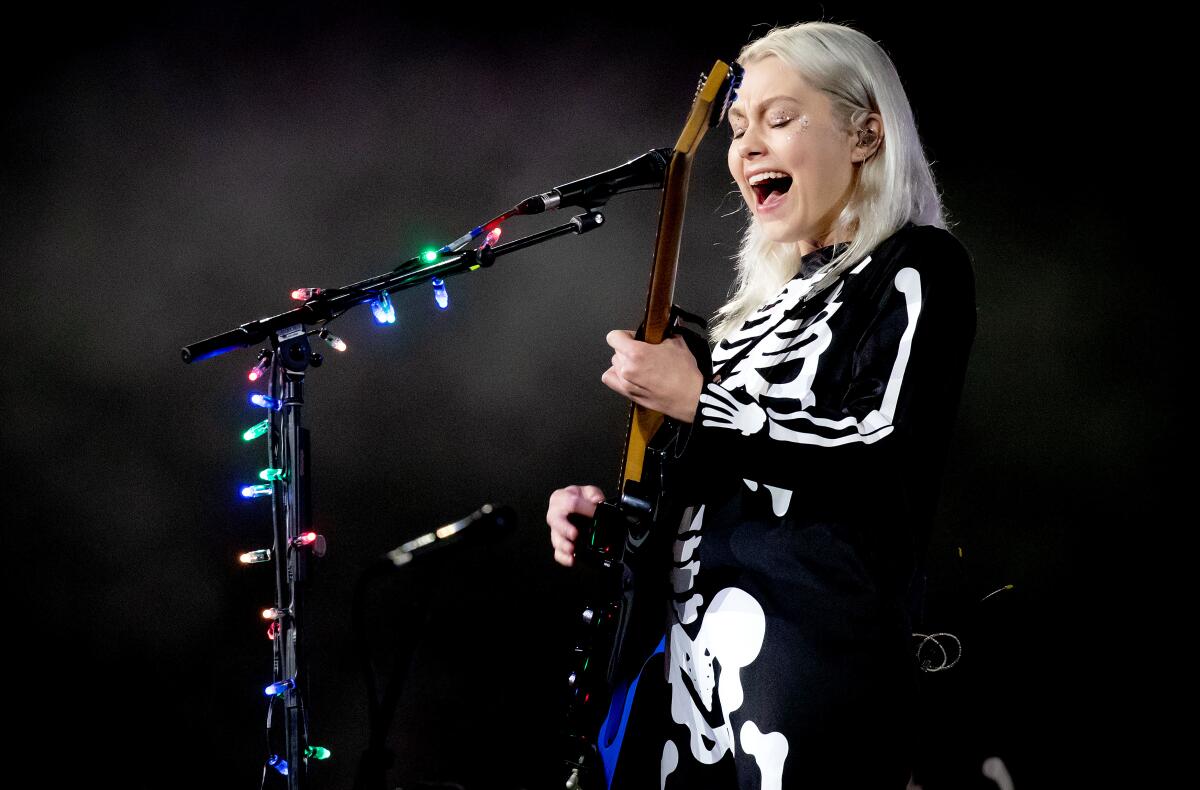
Touring provides the bulk of income for most artists, the majority of whom have not performed live in a year and a half. But in just the last few weeks, acts including BTS and Nine Inch Nails have canceled stadium and festival headline dates. Live events company AEG Presents canceled the New Orleans Jazz & Heritage Festival. Garth Brooks yanked five stadium gigs, and country duo Florida Georgia Line nixed its tour. Neil Young bowed out of Farm Aid. Stevie Nicks preemptively backed out of several planned headline gigs; the Pixies canceled their fall tour and festival dates, while Phoebe Bridgers moved all of her upcoming shows to outdoor venues and will require proof of vaccination wherever possible. The metal band Korn rescheduled dates on its summer tour after singer Jonathan Davis tested positive for COVID-19.
“When originally planned, these shows were intended to be a cathartic return to live music,” Nine Inch Nails wrote on social media announcing the cancellations. “However, with each passing day it’s becoming more apparent we’re not at that place yet.”
Both independent clubs and major promoters like Live Nation and AEG Presents have responded by implementing or strengthening requirements for fans to be fully vaccinated (or, at minimum, have a recent negative COVID-19 test). L.A. County has mandated masking at all outdoor gatherings larger than 10,000 people, including outdoor festivals and sports events, and masks are already required in all indoor public settings. Individual artists such as the Eagles and Dead & Company demanded their own vaccine mandates as part of their contracts.
Jay Marciano, chairman and chief executive of AEG Presents, which produces the Coachella and Day N Vegas festivals as well as shows at L.A. venues including Staples Center and the El Rey Theatre, said his company’s coming Oct. 1 vaccine requirement for all fans and staff — a negative test will not suffice after that — should give show-goers more confidence.
“The good news is that, far and away, artists, fans and our live event staffs have applauded our action. They appreciate this is not political positioning and that AEG Presents has undertaken this measure to help create a safer environment,” Marciano said.
He added that while some ticket sales for upcoming shows may be affected by Delta fears, “I believe it cuts both ways,” he said. “A minority of fans will disagree with our policy, but this has been offset by fans who were concerned about attending shows and now believe it is safer to do so.”
Live Nation, the country’s largest concert promoter, will mandate vaccines or a recent negative test for all show-goers and staff beginning Oct. 4. The Los Angeles Philharmonic will require vaccines for fans at Walt Disney Concert Hall. (The 18,000-capacity Hollywood Bowl abides by current L.A. County guidance for large events and does not require vaccines or testing for entry yet, though masks will now be mandatory for most shows.)
So far, large outdoor U.S. festivals like Live Nation’s 385,000-capacity, three-day Lollapalooza have not been major vectors for disease spread (the Chicago festival required vaccines or negative tests to attend). But some festival promoters have raced to accommodate the new Delta reality.
Sean Miyashiro, founder of the pan-Asian rap and electronic label 88 Rising, whose Head in the Clouds festival comes to the Rose Bowl in November, said that some international artists have had to drop off his bill because of logistical complications due to the virus.
When a foreign artist requires a big block of visas to perform in the U.S., “That’s where it gets difficult,” Miyashiro said. “People can be fully vaccinated and want to play, but some acts aren’t able to come.”
A handful of Republican-led states, including Florida and Texas, have made touring more complex by forbidding vaccine or mask mandates at businesses, including concert venues. For artists and crews desperate to return to the road, and for hard-hit local venues doing their best to protect fans, the varying state-to-state policies have make safety calculations more difficult. (It’s a volatile political issue too: One Texas venue representative, reached for comment, said, “We have no interest in discussing this matter on the record.”)
“The most frustrating thing since day one has been the wide variety of protocols, regulations and laws on the city, state and national level,” said Numa Saisselin, president of the Florida Theatre Performing Arts Center in Jacksonville, Fla.
Even national promoters like Live Nation and AEG Presents, who would otherwise mandate vaccinations and masks for fans and staff, cannot do so there due to state laws and regulations.
“Several promoters made big proclamations about mandates, but there’s always an asterisk about ‘except where it violates the law,’” Saisselin said. “At the risk of dipping a toe in politics, if there were at least a real national protocol, it would be a terrific help.”
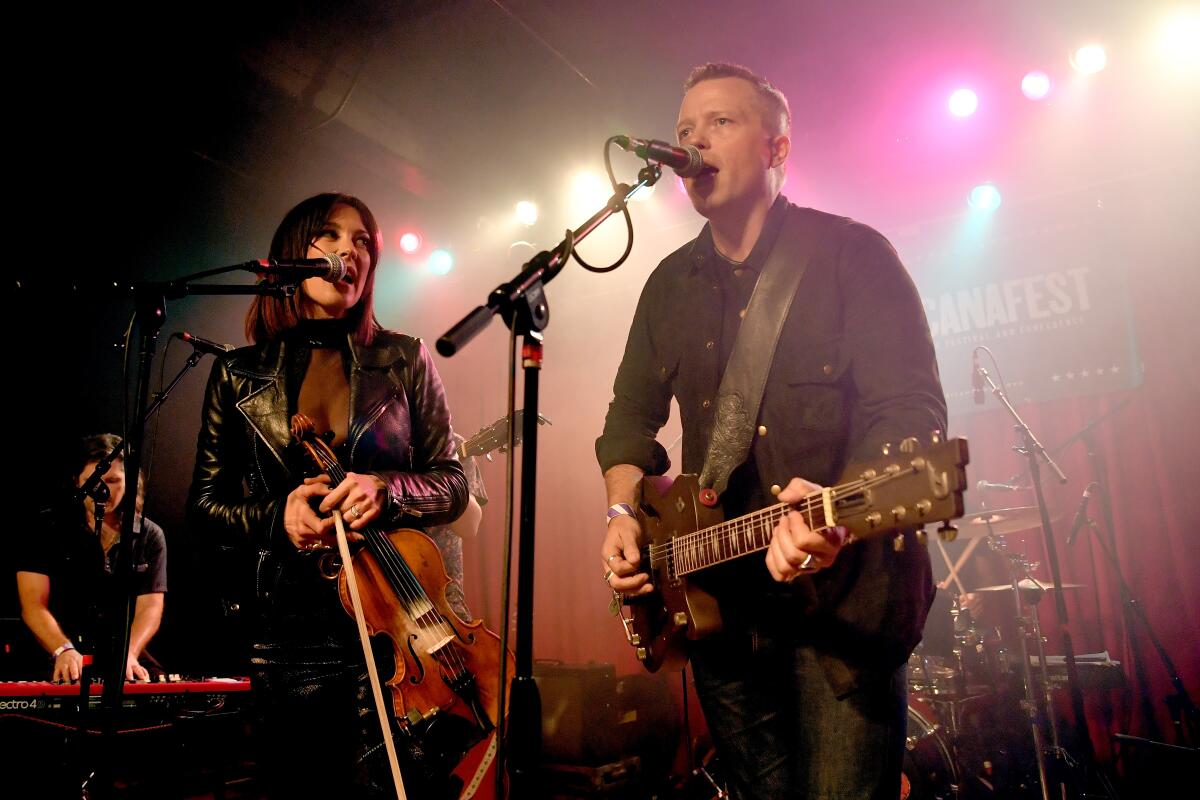
For artists, especially those with big fan bases in the South, the risks of Delta after a year and a half off the road make the lack of support and consistency feel maddening. Grammy-winning alt-country singer Jason Isbell required vaccinations or tests at his shows regardless of a venue’s existing rules. “If the venue won’t allow that, we won’t play,” Isbell said in announcing the policy. He later canceled a festival gig and a show in Houston that wouldn’t screen guests.
But for artists, canceling any dates right now is a big setback, and they’re getting angry.
“I feel like every touring artist has had PTSD since February of 2020, to be honest,” said Ruston Kelly, the Nashville singer-songwriter going on his first tour since COVID-19 scrapped his plans to support last year’s “Shape & Destroy” LP. He’s headlining the Theatre at the Ace Hotel on Oct. 9.
Kelly is adamant that all artists and crews, vaccinated or not, should routinely test on tour, even at the risk of canceling dates. The singer, who is vaccinated, said he had a breakthrough case of COVID-19 weeks ago.
“We all come from a culture of ‘The show must go on,’” says Kelly. “But we’re putting our professional lives at stake every time we swab our nose on the road, and we’re pissed that we still have to do this for everyone who doesn’t want to protect themselves.”
Unvaccinated artists are a difficult piece of the live-show puzzle. Live Nation does not yet have a requirement for artists to be fully vaccinated. Van Morrison, who has publicly opposed vaccine requirements, has a Live Nation-booked lease event at the Hollywood Bowl on Oct. 2. (Reps for Morrison did not immediately return requests for comment regarding his vaccination status.) Eric Clapton, who starts a U.S. tour in September, has said he will cancel shows at any venue that requires proof of vaccination.
A representative for the L.A. Philharmonic said, “At both the Hollywood Bowl and the Ford, we have a controlled environment both onstage and backstage where there is a full vaccination mandate and only essential personnel are allowed in those areas. Those that have religious or disability exemptions are PCR tested within 48 hours of their first onsite visit and are required to wear a mask at all times, except for the limited duration of their performance if the artist is a singer or wind/brass musician.”
In local L.A. music circles, rumors circulate about acts that are unvaccinated yet have local headline dates approaching. AEG Presents’ Marciano said, “At a minimum, we are requesting all artists’ touring personnel provide proof of vaccination or onsite day-of-performance testing, for which AEG will provide and pay.”
“It’s important that the industry take a stance and not leave it to the artists to come out pro- or anti- on the proof-of-vaccination front,” Oak View Group’s Waddell said.
For Madeline, Delta has her thinking twice about getting back on the road right now.
“I’m turning down work,” she said, exasperated, “because the first question I ask is, ‘What’s your COVID-19 policy,’ and many artists don’t have one.”
- Share via
Watch L.A. Times Today at 7 p.m. on Spectrum News 1 on Channel 1 or live stream on the Spectrum News App. Palos Verdes Peninsula and Orange County viewers can watch on Cox Systems on channel 99.
More to Read
The biggest entertainment stories
Get our big stories about Hollywood, film, television, music, arts, culture and more right in your inbox as soon as they publish.
You may occasionally receive promotional content from the Los Angeles Times.
